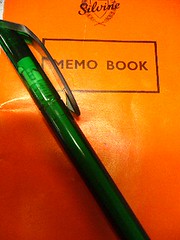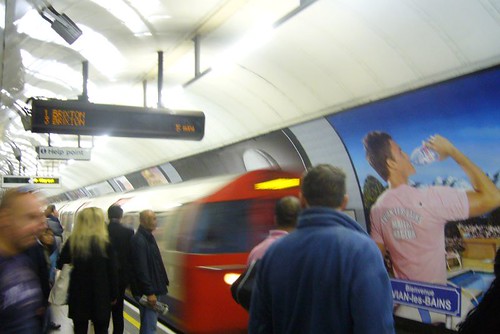Why does everything have to be so interesting all the time? Here is my attempt to balance the scales by producing something incredibly boring.
Shining Eyes
Industrious Waste
 I spent the day clearing out paper related to educational technology. Erm, exactly. So how many black sacks do you think I managed to fill?
I spent the day clearing out paper related to educational technology. Erm, exactly. So how many black sacks do you think I managed to fill?Spot the Differences in Technology: Ain’t No Doubt
Here’s something your students may find mildly amusing. This music video from 1992 features several examples of technological changes; can you spot them?
Here’s what you might have noticed:
- Mercury phone booth.
- Switchboard: one of the old-fashioned types where the operator had to physically plug different cables in to the board to connect people with each other over the phone network.
- Instruments: the musicians are playing real ones, not synthesisers.
- Microphone: a big old-fashioned one, not a headset mike (which was first used years before by Kate Bush, apparently).
- Wristwatch: someone is wearing one. These days, young people tend not to because they use their cell phones to find out the time and a whole load of other functions.
My First Blog Post
As far as I can ascertain, this was my very first blog post. (Not my very first online writing, which had been published around seven years earlier.)
The sad thing is that nothing has changed -- except for the fact that I now receive even more of these inane messages!
22:13 2002-05-22
 Make a note of thisToday I had a great email. It started: "Hi [firstname]," and then went on to tell me how this product could make me loads of money.
Make a note of thisToday I had a great email. It started: "Hi [firstname]," and then went on to tell me how this product could make me loads of money.
I should have thought the first step in making pots of money is to find out basic things like your target's name, and perhaps the second thing would be to make sure the mail-merge works.
That's one company that won't be getting my custom (along with all the others whose emails are automatically dumped in my Trash folder -- but that's another story!)
This Small World
We take so much for granted, we digital citizens. But every so often I stop to think of the 'amazingness' of it all. Here's an example of what I mean:
 It's a small worldI've just come back from the Naace 2010 conference in England where I met up with a Canadian fellow, Michael Furdyk, co-founder of Taking IT Global. I first met Michael at the ICTLT 2010 Conference in Singapore a couple of weeks ago.
It's a small worldI've just come back from the Naace 2010 conference in England where I met up with a Canadian fellow, Michael Furdyk, co-founder of Taking IT Global. I first met Michael at the ICTLT 2010 Conference in Singapore a couple of weeks ago.
He happens to know someone called Derek Wenmoth, from New Zealand, whom Elaine and I had dinner with on Friday night. He was in Singapore too, and I first 'met' him by being introduced to him by Sharon Peters, a Canadian Blogger.
If my memory serves me well, Sharon introduced herself to me after hearing of a book I was on, through Jennifer Wagner, an American educator.
And I think that Jennifer and I got to know each other through the blogosphere after I'd published a free book about Web 2.0, Coming of Age, that feaured, amongst other writers, David Warlick, who also lives in the USA.
Who could have predicted 15 years ago that anything like this would ever happen?
What Is The Meaning Of 'Good'?
Transport for London clearly uses a very different sort of dictionary to the rest of us. Take, for example, its use of the word 'planned', as in 'Planned engineering works'. This is the term used to justify and explain the fact that public transport, by tube at least, becomes an endurance, intelligence and orienteering test worthy of the Duke of Edinburgh Award at the weekends.
 A photo of a train in serviceTake this weekend, for example. What should have been a simple and straightforward journey home after the BETT Show turned out to be a task akin to one of Hercules' Labours. My plan was to get on the Circle Line at Gloucester Road, sit there and cogitate, meditate or sleep until I arrived at Liverpool Street, and then take the National Express train home.
A photo of a train in serviceTake this weekend, for example. What should have been a simple and straightforward journey home after the BETT Show turned out to be a task akin to one of Hercules' Labours. My plan was to get on the Circle Line at Gloucester Road, sit there and cogitate, meditate or sleep until I arrived at Liverpool Street, and then take the National Express train home.
Unfortunately, TfL had other ideas.
Because of so-called 'planned engineering works', the Circle Line was completely suspended, the District Line was also suspended, no Piccadilly Line trains were stopping at Kings Cross, and even if they had been it would have made no difference because the Hammersmith and City Line was partially suspended.
The result was that, after spending a bit of time deciding which of the possible routes home was the least arduous, I spent the next two hours on a long, circuitous journey, standing virtually all the way.
Before I get on to the bit that relates to the title of this article, let me just say something about this 'planning'. To use an Americanism (which I don't often do but in this case the expression fits), it sucks. Any 15 year old with a rudimentary knowledge of Excel could devise a better plan that this. How come other countries are able to upgrade their metro systems without all the disruption that we Londoners have to suffer, every single weekend?
But this time TfL surpassed itself.
This was the weekend in which the BETT Show finished.
The BETT Show is the biggest show of its kind in Britain.
The BETT Show is the biggest show of its kind in the world.
This year the BETT Show had 700 exhibitors and attracted 30,000 visitors.
Surely someone at TfL might have looked at a calendar of events and thought that perhaps Saturday 16th January 2010 was not a great time to suspend half of the tube?
When I was project managing a major school refurbishment, which at one stage involved closing one of the entrances, I consulted with all the stakeholders I could think of -- even including local residents who would be affected by all the kids going past their houses because their usual route to school would no longer be any good.
As it happens, I upset the patrons of the local church, because nobody had thought to tell me that they used that school entrance every Sunday in order to park their cars in the playground. But that only goes to illustrate the importance of consulting with as many people as possible before taking major actions.
Anyway, here we have possibly 30,000 people rattling around trying to find their way home or to the airport or to their hotels, and someone announces that, apart from the fact that half the network doesn't work (making it a 'notwork'), there is a good service.
A good service!!
That's like a teacher saying to an inspector: 'Twenty percent of my class will fail the course; a further 30% will get a lower grade that they should. Apart from that, I'm providing a good service.'
If walking for miles from one line to another at one interchange, standing most of the way for two hours, being crowded along with all the people who would have taken other routes, at the end of a very long week is considered a 'good' service, all I can say is let's hope and pray we never have a bad one.
The Big Sweep
Jack Alibi knew how to work. He also knew how to work a scam. Sure, going legit was good, but it took time. Lack of time was something Alibi had plenty of.
 He knew from the wire that the local school was being rebuilt, and that they were looking to put in a heap of technology. As far as Alibi was concerned, selling computers was like a licence to print money.
He knew from the wire that the local school was being rebuilt, and that they were looking to put in a heap of technology. As far as Alibi was concerned, selling computers was like a licence to print money.
He staked out the school and got to know the movements of the big cheese, a classy dish who barely looked old enough to have left school, let alone run one. One night he waited in a doorway for her to pass.
As she did he started walking and brought himself up alongside her.
"Hey, honey", he grinned. "How about a little coffee?"
She didn't respond, except maybe her pace stepped up a notch.
Alibi went into phase two of his plan.
"I hear you're looking for high tech stuff. Maybe I can cut you a sweet deal."
She ignored him, but he continued.
"That stuff costs a lot of lettuce. That means less to spend on a fancy office and all the trimmings. Maybe I can help out."
She stopped and glared at him.
"Oh yeah?", she said. "And why would you wanna be helping someone you don't even know?"
"On account that I'm community-minded. Besides, I'd hate to see a classy dame like you being taken for a ride. I can get what you need at a whole lot less."
She remained motionless, but a quick glint in her eye let Alibi know she was interested.
"OK", she said. "Let's suppose I'm interested, which I ain't. But let's be hypothetical. What are you offering, and what's your rake-off?"
Alibi was ready for that: he'd done his homework.
"I get all the tech you need, on a no questions asked basis. Hypothetically. As for me, I work on commission, 5% of the value of the merchandise. That hardly pays my rent. But Like I said, I'm community-minded."
She looked at him like he was something that was tossed out in the garbage the night before.
"Yeah, I can see you're all heart. OK, muscle head, you talk big, but maybe that's all you do? Talk, I mean. My guess is that this ‘merchandise' is old cast-off junk, right? That ain't no use to me. I just took over running this joint, see? I'm the new broom around here, and there's gonna be one hell of a big sweep. No jackass like you is gonna louse things up for me."
"OK, sister, I get the picture, but you got me all wrong. I tell ya, lady, this stuff is so new it uses technology that ain't even been invented yet."
She reached inside her bag. Alibi's hand went instinctively to inside his coat. She pulled out a packet of gaspers, put one to her lips. He lit it for her.
"I tell you what I'm gonna do", she purred. "I'm gonna think about it."
She drew on the butt and let out a plume of smoke.
"Well, I thought about it. No."
"No? How come?"
"Well, Buster, I just remembered the advice my daddy gave me when I was knee-high to a cricket."
"Oh yeah? And what might that be?"
"Never accept suites from strangers."
Thanks to William Denton for his Dictionary of Hardboiled Slang.
This story originally appeared in the September 2009 edition of Computers in Classrooms.
